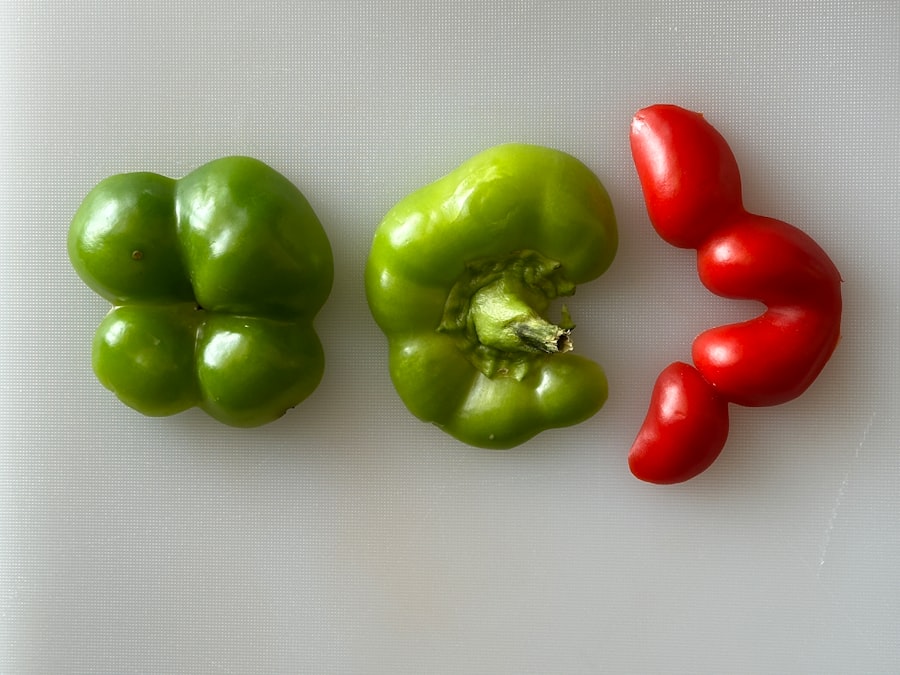Bell peppers, with their vibrant colors and crisp texture, are a staple in many kitchens around the world. You may find them in salads, stir-fries, or as a crunchy snack. Beyond their culinary appeal, bell peppers are also known for their potential health benefits, particularly concerning digestion.
Understanding how these colorful vegetables interact with your digestive system can help you make informed choices about your diet. As you explore the relationship between bell peppers and digestion, you might discover that these vegetables are not only delicious but also packed with nutrients that can support your overall health. However, like any food, they can have varying effects on different individuals.
This article will delve into the nutritional value of bell peppers, their fiber content, and how they can impact your digestive health positively or negatively.
Key Takeaways
- Bell peppers are a great addition to a digestive-friendly diet due to their high fiber content and nutritional value.
- The fiber in bell peppers can aid in digestion by promoting regular bowel movements and preventing constipation.
- Bell peppers can have a positive impact on digestive health by reducing the risk of certain digestive disorders and promoting a healthy gut microbiome.
- Incorporating bell peppers into a digestion-friendly diet can be done by adding them to salads, stir-fries, or as a crunchy snack with hummus.
- It’s important to manage portion sizes and cooking methods when consuming bell peppers to avoid potential digestive issues such as heartburn or gas.
Nutritional Value of Bell Peppers
When you consider the nutritional profile of bell peppers, you’ll find that they are low in calories yet rich in essential vitamins and minerals. A single medium-sized bell pepper contains a wealth of nutrients, including vitamin C, vitamin A, and several B vitamins. These vitamins play crucial roles in maintaining your immune system, promoting healthy skin, and supporting energy metabolism.
Moreover, bell peppers are an excellent source of antioxidants, which help combat oxidative stress in your body. The vibrant colors of bell peppers—red, yellow, and green—indicate the presence of various phytonutrients that contribute to their health benefits. By incorporating bell peppers into your meals, you not only enhance the flavor but also boost the nutritional value of your diet.
Fiber Content in Bell Peppers

Fiber is a vital component of a healthy diet, and bell peppers contribute to your daily intake in a significant way. While they may not be the highest fiber vegetables available, they still provide a respectable amount that can aid in digestion. A medium bell pepper contains about 2 grams of dietary fiber, which can help regulate bowel movements and promote a healthy gut.
Incorporating fiber-rich foods like bell peppers into your meals can help you feel fuller for longer, potentially aiding in weight management. Additionally, fiber plays a crucial role in maintaining gut health by supporting the growth of beneficial bacteria in your digestive system. As you consider your dietary choices, remember that the fiber content in bell peppers can be a valuable addition to your overall nutrition.
Impact of Bell Peppers on Digestive Health
| Study | Findings |
|---|---|
| Study 1 | Bell peppers are rich in fiber, which promotes healthy digestion by preventing constipation. |
| Study 2 | The high content of vitamins A and C in bell peppers supports a healthy digestive system. |
| Study 3 | Consuming bell peppers may help reduce the risk of developing digestive disorders such as irritable bowel syndrome (IBS). |
The impact of bell peppers on digestive health can be both positive and nuanced. On one hand, their fiber content can promote regularity and prevent constipation, making them a beneficial addition to your diet. The antioxidants found in bell peppers may also help reduce inflammation in the gut, contributing to overall digestive wellness.
However, it’s essential to recognize that not everyone may tolerate bell peppers well. Some individuals may experience digestive discomfort after consuming them due to their skin or certain compounds present in the vegetable. Understanding how your body reacts to bell peppers is crucial for optimizing your digestive health while enjoying their many benefits.
Potential Benefits of Bell Peppers for Digestion
One of the primary benefits of bell peppers for digestion is their ability to support gut health through their fiber content. As you consume more fiber-rich foods like bell peppers, you may notice improvements in your bowel regularity and overall digestive comfort. Fiber helps bulk up stool and facilitates its passage through the intestines, reducing the risk of constipation.
Additionally, the antioxidants in bell peppers can play a role in reducing inflammation within the digestive tract. This anti-inflammatory effect may help alleviate symptoms associated with conditions like irritable bowel syndrome (IBS) or other gastrointestinal disorders. By incorporating bell peppers into your meals, you may find that they contribute positively to your digestive health.
Potential Disadvantages of Bell Peppers for Digestion

While bell peppers offer numerous benefits for digestion, it’s important to acknowledge that they may not be suitable for everyone. Some individuals may experience gas or bloating after consuming bell peppers due to their fiber content or specific compounds like solanine found in nightshade vegetables. If you have a sensitive stomach or a history of digestive issues, you might want to monitor your intake of bell peppers closely.
Moreover, the skin of bell peppers can be tough for some people to digest. If you find that whole bell peppers cause discomfort, consider peeling them before consumption or opting for cooked versions instead. Cooking can break down some of the fibrous components and make them easier on your digestive system.
How to Incorporate Bell Peppers into a Digestion-Friendly Diet
Incorporating bell peppers into a digestion-friendly diet can be both enjoyable and straightforward. You might start by adding sliced bell peppers to salads for a crunchy texture or tossing them into stir-fries for added color and flavor. Roasting or grilling bell peppers can enhance their sweetness while making them easier to digest.
If you’re looking for creative ways to enjoy bell peppers, consider stuffing them with quinoa or brown rice mixed with vegetables and spices for a nutritious meal. You could also blend them into smoothies for an unexpected burst of flavor and nutrients. The versatility of bell peppers allows you to experiment with various recipes while reaping their digestive benefits.
Tips for Managing Digestive Issues Related to Bell Pepper Consumption
If you find that bell peppers occasionally cause digestive discomfort, there are several strategies you can employ to manage these issues effectively.
Start with small amounts and gradually increase your intake as tolerated.
Another helpful tip is to cook bell peppers before eating them. Cooking can soften their skin and make them easier to digest while still retaining their nutritional value. Additionally, consider pairing bell peppers with other foods that are gentle on the stomach, such as lean proteins or whole grains, to create balanced meals that support digestion.
Other Factors to Consider for Digestive Health
While focusing on bell peppers is essential for understanding their role in digestion, it’s equally important to consider other factors that contribute to overall digestive health. A well-rounded diet rich in various fruits and vegetables will provide a broader spectrum of nutrients and fiber necessary for optimal gut function. Staying hydrated is another crucial aspect of maintaining digestive health.
Drinking enough water throughout the day helps keep things moving smoothly through your digestive tract. Regular physical activity also plays a vital role in promoting healthy digestion by stimulating intestinal contractions and improving gut motility.
Balancing Bell Pepper Consumption for Digestive Health
In conclusion, bell peppers can be a valuable addition to your diet when it comes to supporting digestive health. Their nutritional value, fiber content, and antioxidant properties make them beneficial for many individuals seeking to improve their gut function. However, it’s essential to listen to your body and recognize how it responds to these colorful vegetables.
By balancing your consumption of bell peppers with other nutritious foods and being mindful of portion sizes, you can enjoy their many benefits while minimizing any potential discomfort. Remember that everyone’s digestive system is unique; what works for one person may not work for another.
Expert Insights and Recommendations for Bell Pepper Consumption and Digestive Health
Experts often recommend incorporating a variety of colorful vegetables into your diet for optimal health benefits.
They also emphasize the importance of listening to your body’s signals; if you experience discomfort after eating bell peppers, it may be worth consulting with a healthcare professional or registered dietitian.
Ultimately, the key takeaway is moderation and variety. By including bell peppers as part of a diverse diet rich in fruits, vegetables, whole grains, and lean proteins, you can support your digestive health while enjoying all the flavors these vibrant vegetables have to offer.
Bell peppers are a popular vegetable known for their vibrant colors and crisp texture, but some people wonder if they might be difficult to digest. While bell peppers are generally considered healthy and are a good source of vitamins A and C, their skin can be tough for some individuals to break down, potentially leading to digestive discomfort. For those interested in learning more about how different foods can impact digestion, an article on Explore Senior Health provides valuable insights into dietary choices and their effects on the digestive system. You can read more about this topic by visiting Explore Senior Health.
Over 60? Ditch THIS Sneaky Veggie Wrecking Digestion, Bloating, and Microbiome Balance.
FAQs
What are bell peppers?
Bell peppers are a type of vegetable that come in various colors such as green, red, yellow, and orange. They are known for their sweet and crunchy taste and are often used in cooking and salads.
Are bell peppers bad for digestion?
No, bell peppers are not bad for digestion. In fact, they are a good source of fiber, which can aid in digestion and promote a healthy digestive system.
Can bell peppers cause digestive issues?
For some individuals, consuming bell peppers may cause digestive issues such as gas or bloating. This is because bell peppers contain compounds that can be difficult for some people to digest. However, this varies from person to person.
How can I minimize digestive issues when consuming bell peppers?
To minimize digestive issues when consuming bell peppers, you can try cooking them, as this can make them easier to digest. Additionally, removing the seeds and membranes from the peppers may also help reduce the likelihood of experiencing digestive discomfort.
Are there any health benefits to consuming bell peppers?
Yes, bell peppers are a good source of vitamins A and C, as well as antioxidants. They also contain fiber, which can aid in digestion and promote a healthy gut. Overall, bell peppers can be a nutritious addition to a balanced diet.
